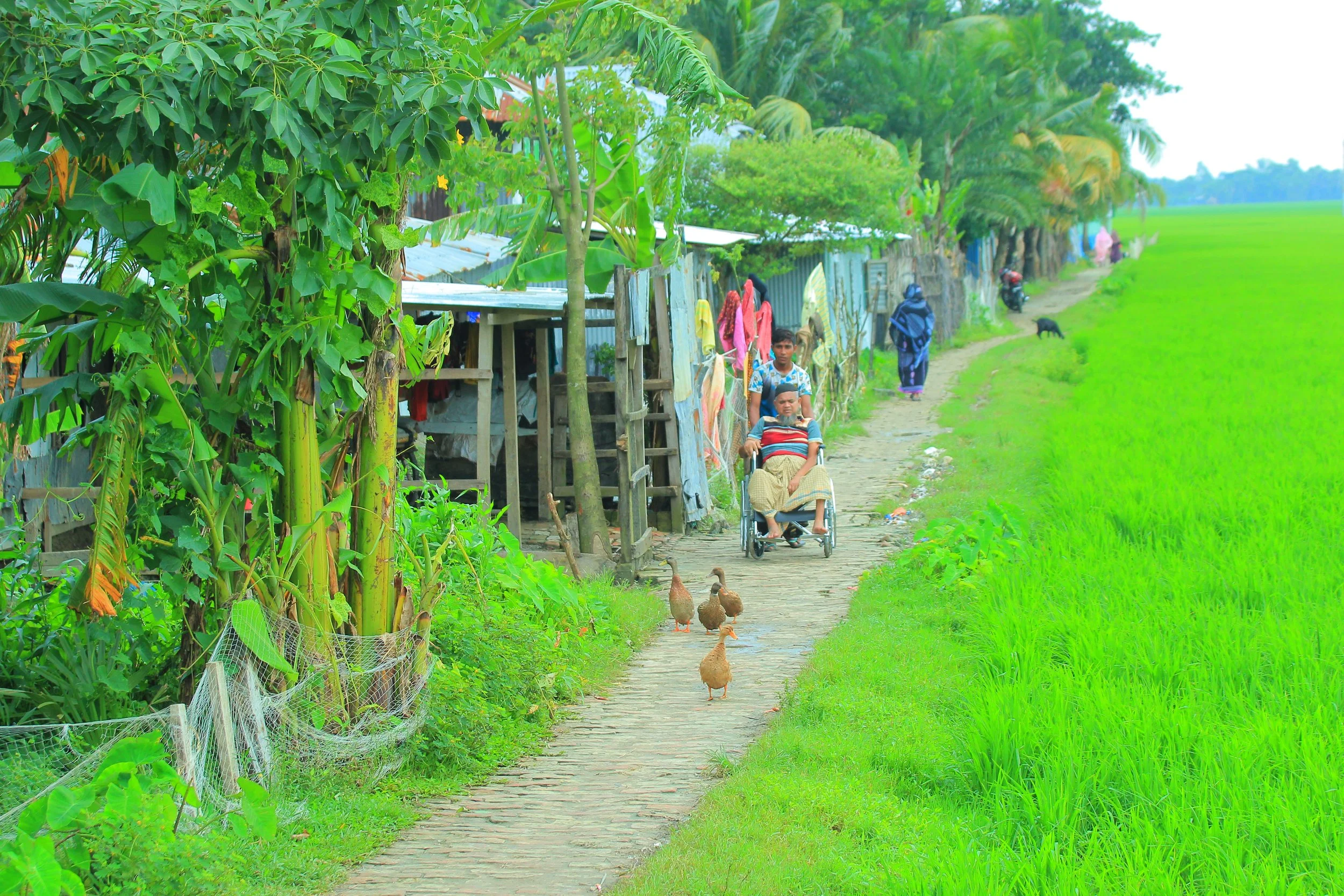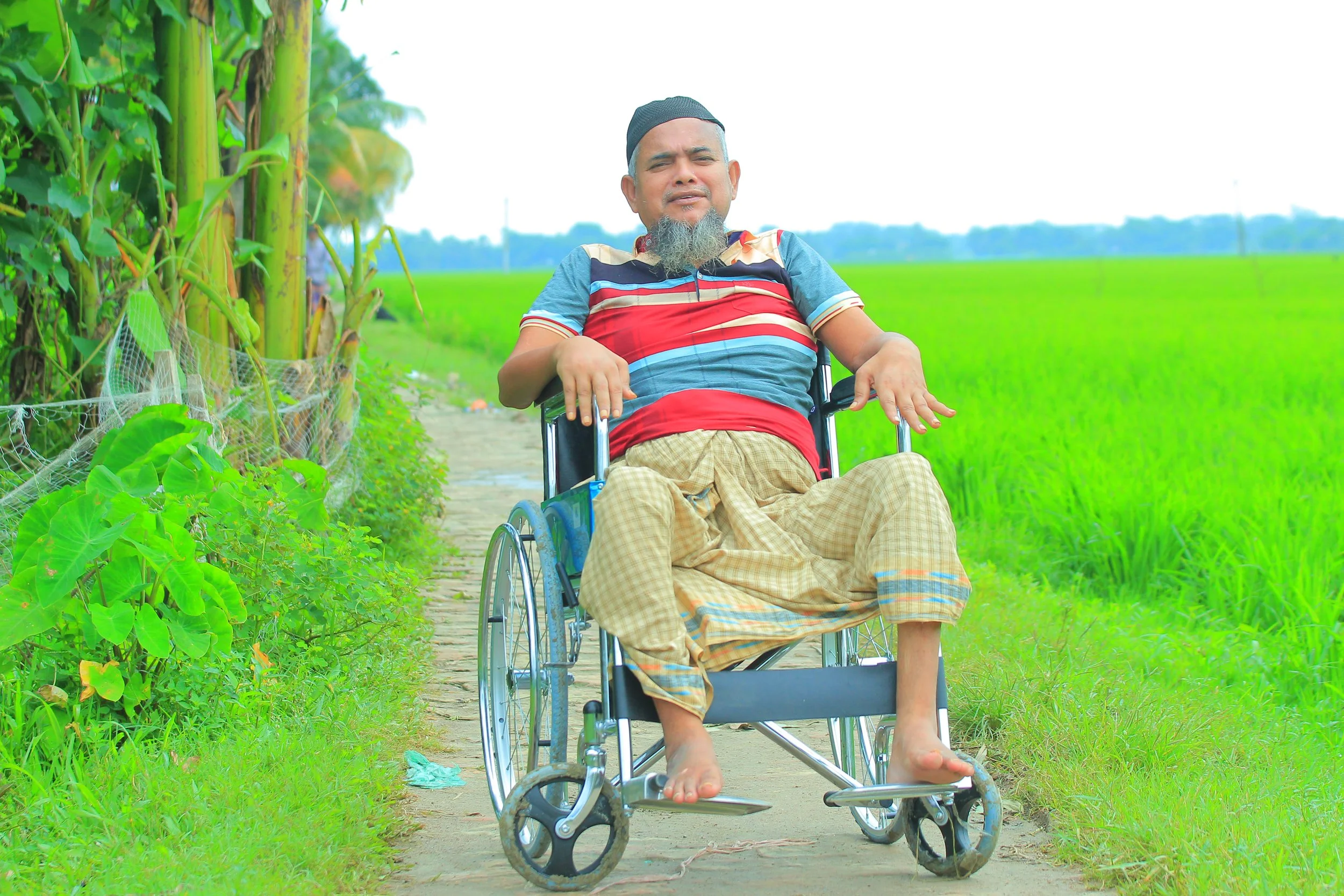How the Sundarban Coalition Tackles Disasters and Inequality in Bangladesh's Coastal Region
Abdul Huq in Kalapara division, Patuakhali. Photo by Shahidul Islam Shishir
—First published on LinkedIn on October 13th, 2023—
Written by Mahfuza Mala, The Share Trust Bangladesh Country Representative, with Toscane Clarey, The Share Trust Communications Lead
The coastal region of Bangladesh grapples with the relentless impacts of climate change. However, in Patuakhali, a district known for its vulnerability to climate disasters, a compelling tale of resilience and equity unfolds.
Abdul Huq is a local shopkeeper living in the area, in the Kalapara division of Patuakhali. Abdul Huq's life was a daily struggle: at the age of 42, he was diagnosed with diabetes, and his dire financial situation prevented him from seeking the treatment he needed. Tragically, this led to his paralysis, and he lost the use of both of his legs. Unable to afford a wheelchair, the simple act of moving from one place to another became a daunting challenge, and he relied on the generosity of others so that he could continue to provide for his family’s most fundamental needs, including food and clothing. In an area so affected by disasters such as cyclones, lack of mobility can pose a huge threat to his and his family's safety; persons with disabilities are frequently the most affected by natural hazards. Abdul Huq's experience highlights how disability and poverty can amplify the impacts of climate change, a complex struggle many face in the region.
Then came the Sundarban Coalition: a multi-sectoral group of 16 Community-Based Organizations (CBOs) working together to build climate resilient communities in Bangladesh's coastal areas. They leverage each other’s strengths to tackle the complex interconnectedness of disasters, poverty, and inequality, leading a locally designed and implemented response. Sundarban Coalition member, Golap Protibondi Unnayan Songstha, provided Abdul Huq with a wheelchair, a symbol of independence. With his wheelchair, Abdul Huq's mobility improved dramatically. No longer bound by the limitations of his disability, he regained his agency and dignity. This seemingly ordinary assistive mobility device was the key to unlocking a world of opportunities.
"I have been striving to acquire a wheelchair for the past 7-8 years. Unfortunately, the funds I had saved were repeatedly redirected to cover essential necessities. Except for one compassionate individual in my neighborhood, who would kindly carry me in their arms, transportation was a significant challenge. My physical condition made it burdensome for others, and if that person had work or had to leave the area, I found myself stranded at home, feeling incredibly helpless. Acquiring this wheelchair from the Sundarban Coalition has been a life-changing experience for me. With a little assistance from anyone, I can now venture outdoors. I have the freedom to explore the streets and move about as I want."
Through the Sundarban Coalition, he also received approximately 96 USD as livelihood support, enabling him to procure essential items for his shop. His shop, once a modest corner store, now flourished and his income increased, allowing him to better support his family and contribute to his community.
“My shop used to be located along the bustling market road, which significantly boosted my sales. However, when the government cleared the roadside shops to widen the road, I had to relocate my shop. This transition caused damage to many of the products I had in stock. After setting up shop in this narrow alley, I struggled to afford new goods and repay the borrowed money I had acquired. The wheelchair and financial support I received from the Sundarban Coalition has made a tremendous difference in my life. I can now purchase larger quantities of goods at once. Where I used to make sales of 200-300 taka per day, I now earn 600-700 taka daily.”
Now, Abdul Huq is actively working alongside Golap Protibondi Unnayan Songstha to advocate for the eradication of societal biases against people with disabilities. The organization is led by Abdul Rahim, an activist who also happens to have a disability. Abdul Huq has joined Abdul Rahim's initiatives, and together they are advocating for the creation of climate-resilient employment opportunities, the reduction of disaster-related risks for individuals with disabilities, and their inclusion in various service institutions such as healthcare, education, and training. Additionally, they are actively working on fostering leadership development and implementing activities aimed at enhancing the overall quality of life for socially marginalized groups.
Abdul Huq is now fighting for the rights of others living with disabilities. Photo by Shahidul Islam Shishir
On this International Day for Disaster Risk Reduction (IDDRR), Abdul Huq stands as a testament to the fact that disaster risk reduction is not just about preparedness; it is about equity. In a region often ravaged by climate induced disasters, including cyclones and rising sea levels, the most vulnerable communities often bear the brunt of these crises, and a recent 2023 UNDRR survey found that there has been limited progress in disability inclusion over the past 10 years. By providing individuals like Abdul Huq with the tools and opportunities to overcome their challenges, the Sundarban Coalition breaks the cycle of inequality that exacerbates the impact of disasters.
As we reflect on this year's DRR Day theme - Fighting Inequality for a Resilient Future - let Abdul Huq's story remind us that disaster risk reduction is about building a world where everyone, regardless of their circumstances, has a fighting chance. A world where the current relationship between disasters and inequality is transformed into one of resilience, hope, and empowerment, one person at a time.
The Sundarban Coalition was inaugurated in Bangladesh in 2022 and it aspires to foster locally-led resilience and humanitarian action in coastal areas. This coalition has formed in partnership with the Local Coalition Accelerator(LCA), an initiative of The Share Trust and the Warande Advisory Centre, and in collaboration with Start Network and Margaret A. Cargill Philanthropies.
For more information on the Sundarban Coalition's work, follow them on Facebook.


